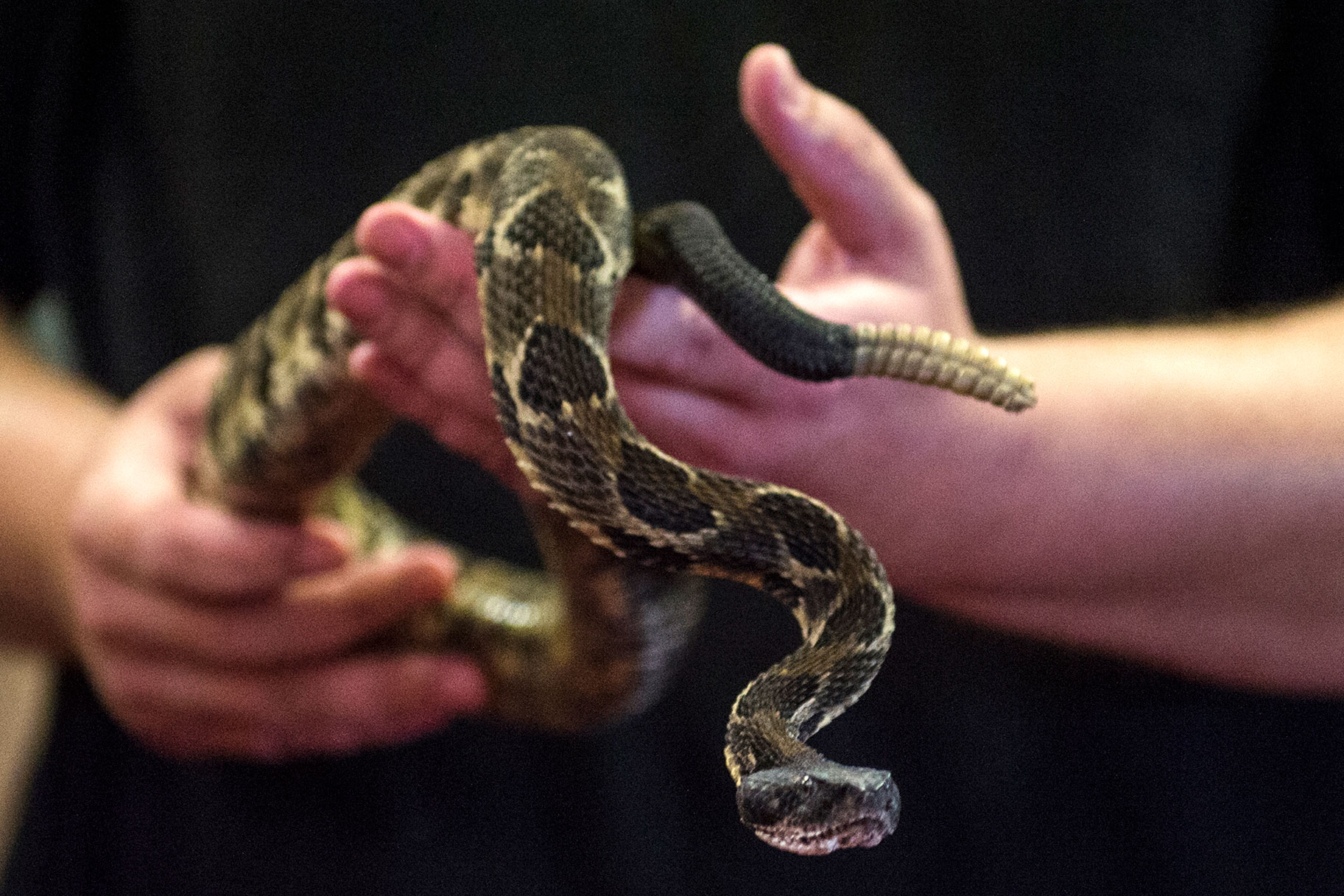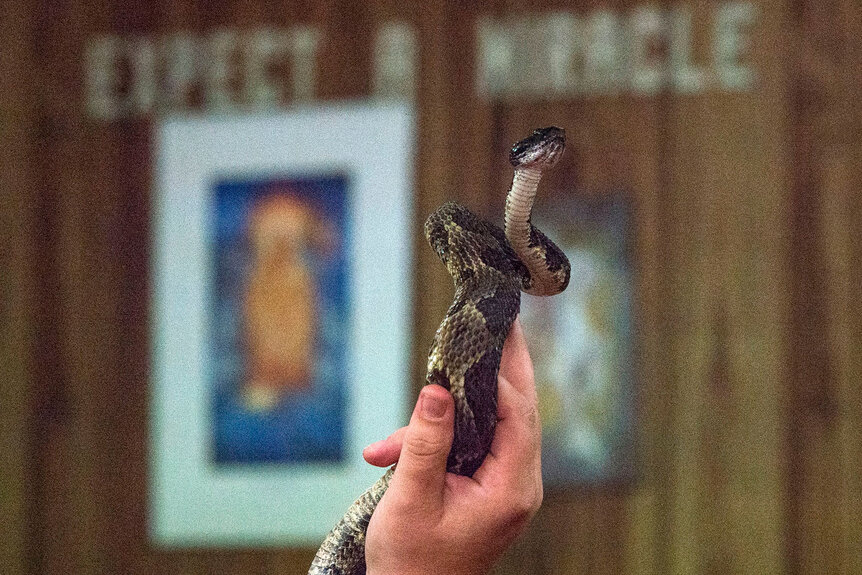Create a free profile to get unlimited access to exclusive videos, breaking news, sweepstakes, and more!
So What's The Story With Religious Snake Handling, As Depicted In 'Alabama Snake'?
Glenn Summerford is currently serving time for the attempted murder of his wife Darlene Summerford, who was bitten by snakes used in a small number of Christian communities across the U.S.

Snake handling, a religious rite involving poisoning snakes practiced in a small number of Christian communities in the U.S., is at the heart of the new true crime documentary “Alabama Snake.”
The HBO film, debuting Wednesday, chronicles the controversial 1991 case of Pentecostal minister Glenn Summerford, who was accused of trying to murder his wife with a rattlesnake in Scottsboro, Alabama in 1991.
Summerford was known in the area for handling poisonous snakes as pastor of the Church of Jesus With Signs Following near Scottsboro and he said in interviews, included in the documentary, that religion had turned him around from a previous life of crime. However, that new image was shaken after his wife Darlene accused him of forcing her at gunpoint to stick her hand into a box of rattlesnakes. She claimed he wanted to kill her so he could date another preacher.
The trial and media frenzy which surrounded the Southern Appalachia case often focused on Summerford’s snake handling, a curiosity to the nation. He was convicted of attempted murder in 1992 and sentenced to 99 years behind bars. He is still imprisoned.
Glenn, in archival interview footage included in the documentary, claims that he was convicted, in part, because of the ritual he was involved in.
So how did snake handling, also commonly referred to as serpent handling, begin?
Michael Toomey, a history professor at Lincoln Memorial University, told Oxygen.com that snake handling started to gain followers in the early 1900s through the efforts of George Hensley, a pastor in Tennessee. Hensley said he was commanded by God to "take up serpents," citing a verse from the Gospel of Mark, according to a 2014 USA Today piece.
“And these signs shall follow them that believe: In my name shall they cast out devils; they shall speak with new tongues. They shall take up serpents; and if they drink any deadly thing, it shall not hurt them; they shall lay hands on the sick, and they shall recover,” the passage states.
“Although it may have been practiced before that,” Toomey told Oxygen.com. “Hensley is said to have been remarkably charismatic, a preacher who traveled throughout Appalachia sharing his convictions. By the early '30s, serpent handling was widespread throughout the region, and Hensley's efforts and his personality had been a critical part of that growth.”
Pentecostal worship services, typically in rural and Appalachian states like Alabama, Kentucky, Tennessee, and West Virginia, would often include members supposedly speaking in tongues in addition to the handling of poisonous snakes. Church members are allowed to approach the snakes — often rattlesnakes, copperheads, and cottonmouths — during the services and pick them up.
Local historian and folklorist Dr. Thomas Burton, who spent his life studying Pentecostal snake handlers, explains in "Alabama Snake" that many snake handlers believe that they have to be anointed with the Holy Spirit in order to handle the snakes.
Cody Coots, son of the late Kentucky pastor Jamie Coots — who died after a snake bit him during a worship service in 2014, not long after he was documented in the 2013 National Geographic show “Snake Salvation” — told Oxygen.com that's how he views snake handling. He said it’s a literal translation of the Bible and said he will not touch the snakes unless he feels the anointing of God. Cody said he feels that snake handling could have begun as far back as Biblical times based on Bible verses he and his peers have studied.
Toomey told Oxygen.com that if a person is bitten, they typically do not seek medical attention.
“The whole point of picking up serpents is in part to verify the truth of the Bible and to illustrate the devotion of the individual,” he said. “If someone is bitten, it doesn't necessarily impact either of those things. The Bible remains true and there can be no doubt that the person was devoted. Even if an individual dies because of the bite, it is understood that it was simply time for that person to die. Whatever happens is God's will; an individual may not be bitten at all, or they may be bitten and survive. But even if they are bitten and die, whatever happens is God's will.”
As a result, 92 people have died from the rite, according to USA Today. Jamie Coots was one such snake handler who refused medical treatment and then died. Cody told Oxygen.com that his father announced a month before he died that he’d rather die in this church house from a snake bite than any other way.
Cody told Oxygen.com that a snakebite is “just a test of fate to see if you will go to the doctor or get medicine.”
Some states have adopted laws to prohibit the practice of snake handling or, at the very least, to limit it to trained individuals to limit deaths. A Kentucky court upheld the state law in 1942 and an Alabama court upheld such a law in 1956. However, the practice still continues in a small number of communities, as is evident with the 1990s-era Summerford case.
Even to this day, the practice is still prevalent. Cody — who was a snake-handling pastor for a time before he remarried, which barred him from doing so — said he still handles snakes and plans to buy more. He said that in his area of Kentucky, snake handling is a misdemeanor, punishable by a $50 to $100 fine or jail time. He noted, however, that typically the authorities don’t get involved unless there is a bite. His father pleaded guilty in 2013 to violating Tennessee's exotic animals law, Buzzfeed News reported following his death.
"They believe they are individually bound to do this," Toomey told USA Today in 2014. "Laws don't matter. If you receive direction like that, state statutes simply don't matter."
Cody said that within a 150 mile radius of his house, there are currently between 15 to 20 churches that involve snake handling. He said it was double that back in the 1980s.
He said for those who don’t understand the practice: “If God don’t open it up to you, there’s nothing I can tell you to open up your mind to get you to do it, too.”


























